八下第四单元知识点
【初中历史】【八下历史】第四单元知识点总结复习提纲

第四单元 民族团结与祖国统一第十二课 民族大团结一、民族区域自治制度1.定义:民族区域自治是在国家统一领导下,在少数民族聚居的地方实行区域自治,按照民族聚居的人口多少和区域大小,设立不同级别的民族自治区域和自治机关。
2、权利:民族自治地方的自治机关依法自主管理本民族、本地区的内部事务,行使自治权。
3.确定:1949年《中国人民政治协商会议共同纲领》确定了民族区域自治制度。
4.地位:民族区域自治制度是我国的基本国策和基本政治制度。
5.民族自治地方分为自治区、自治州、自治县。
6.第一个省级自治区:内蒙古自治区。
7.目前有内蒙古自治区、新疆维吾尔族自治区、广西壮族自治区、宁夏回族自治区、西藏自治区。
8.意义:国家尊重和保障少数民族管理本民族内部事务的权利,维护民族团结,巩固祖国统一,促进少数民族地区发展,为各民族共同繁荣发展奠定基础。
二、共同繁荣发展1.原因:新中国成立初期,我国各民族发展不平衡,很多少数民族生产力水平落后。
2.措施:(1)政治上:因地制宜,进行了民主改革和社会主义改造。
废除了剥削和压迫,迈进了社会主义;(2)经济上:加强少数民族地区经济建设。
(方式国家采取优惠政策,派出大批有员,通过技术、资金、物资等多种形式)(3)文化上:国家重视少数民族文化的保护与发展(方式:保护、发展少数民族文化。
帮助侗族等十几个民族创制文字。
尊重少数民族宗教信仰和风俗习惯,保护文化遗产)。
(4)西部大开发战略:(作用:为少数民族地区的加快发展创造了巨大的历史机遇,极大地带动了少数民族地区的经济社会发展。
)(5)青藏铁路:2006年,青藏铁路全线通车,大加强了祖国内地与边疆地区的联系,促进了青海、西藏经济社会发展。
⑥兴边富民行动。
第13课 香港和澳门回归祖国一、“一国两制”的构想(一)提出:进入改革开放新时期后,邓小平创造性地提出了“一国两制”的伟大构想。
(二)内涵:在祖国统一的前提下,国家的主体坚持社会主义制度,同时在台湾、香港和澳门保持原有的资本主义制度和生活方式长期不变。
新人教版八年级英语(下册)第四单元知识点总结

新人教版八年级英语(下册)第四单元知识点总结新版八年级英语下册unit4知识点归纳Unit 4 Why don’t you talk to your parents?Why don’t you talk to your parents? 你为什么不和你打父母谈谈呢?【解析】Why don't you do sth ?= Why not do sth? 为什么不......呢?【拓展】用于提建议的句型有:(1)What about doing sth ?=How about doing sth? ….怎么样?(2)Why don’t you do sth?= Why not do sth? 为什么不呢?(3)Let’s do sth.让我们一起做某事吧。
(4)Shall we/I do sth?我们做…好吗?(5)had better do/not do sth 最好做/不做某事(6) Will/Would you please do sth 请你做…好吗?(7) Would you like to do sth? 你想去做某事吗?(8)Would you mind doing sth?你介意做某事吗?【回答】(1). 同意对方的建议时,一般用:◆ Good idea./ That’s good idea. 好主意◆OK/ All right./ Great 好/ 行/太好了◆ Yes, please ./ I’d love to 是的/ 我愿意◆ I agree with you 我同意你的看法◆ No problem 没问题◆Sure/ Of course/ Certainly 当然可以◆Yes, I think so 对,我也这样想(2).对对方的帮助或要求表示委婉谢绝时,一般用:◆ I don’t think so 我认为不是这样◆Sorry, I can’t 对不起,我不能◆I’d love to, but…◆ I’m afraid…我愿意,但恐怕……I have to study too much so I don’t get enough sleep.我要学的太多,因此我睡眠不足。
人教版八年级下第四单元《民族团结和祖国统一》知识要点概括
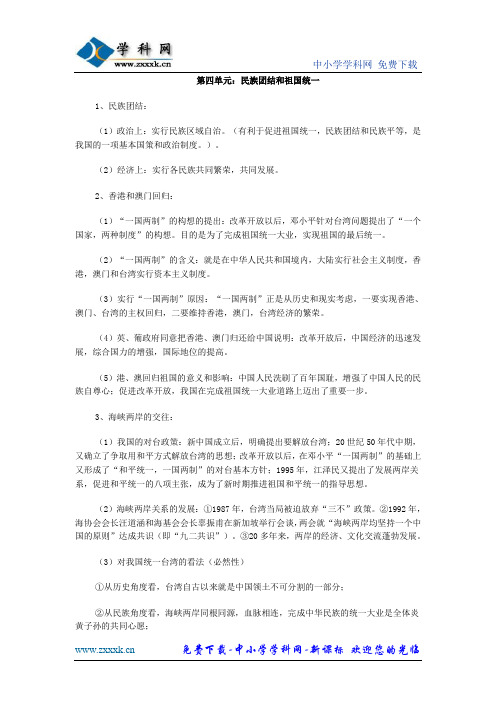
第四单元:民族团结和祖国统一1、民族团结:(1)政治上:实行民族区域自治。
(有利于促进祖国统一,民族团结和民族平等,是我国的一项基本国策和政治制度。
)。
(2)经济上:实行各民族共同繁荣,共同发展。
2、香港和澳门回归:(1)“一国两制”的构想的提出:改革开放以后,邓小平针对台湾问题提出了“一个国家,两种制度”的构想。
目的是为了完成祖国统一大业,实现祖国的最后统一。
(2)“一国两制”的含义:就是在中华人民共和国境内,大陆实行社会主义制度,香港,澳门和台湾实行资本主义制度。
(3)实行“一国两制”原因:“一国两制”正是从历史和现实考虑,一要实现香港、澳门、台湾的主权回归,二要维持香港,澳门,台湾经济的繁荣。
(4)英、葡政府同意把香港、澳门归还给中国说明:改革开放后,中国经济的迅速发展,综合国力的增强,国际地位的提高。
(5)港、澳回归祖国的意义和影响:中国人民洗刷了百年国耻,增强了中国人民的民族自尊心;促进改革开放,我国在完成祖国统一大业道路上迈出了重要一步。
3、海峡两岸的交往:(1)我国的对台政策:新中国成立后,明确提出要解放台湾;20世纪50年代中期,又确立了争取用和平方式解放台湾的思想;改革开放以后,在邓小平“一国两制”的基础上又形成了“和平统一,一国两制”的对台基本方针;1995年,江泽民又提出了发展两岸关系,促进和平统一的八项主张,成为了新时期推进祖国和平统一的指导思想。
(2)海峡两岸关系的发展:①1987年,台湾当局被迫放弃“三不”政策。
②1992年,海协会会长汪道涵和海基会会长辜振甫在新加坡举行会谈,两会就“海峡两岸均坚持一个中国的原则”达成共识(即“九二共识”)。
③20多年来,两岸的经济、文化交流蓬勃发展。
(3)对我国统一台湾的看法(必然性)①从历史角度看,台湾自古以来就是中国领土不可分割的一部分;②从民族角度看,海峡两岸同根同源,血脉相连,完成中华民族的统一大业是全体炎黄子孙的共同心愿;③从现实角度看,海峡两岸日益密切的经济、文化交流,符合两岸人民的共同利益;④从法律角度看,《反分裂国家法》的颁布为解决台湾问题提供了法律依据;⑤从可行性来看,香港、澳门的回归和持续繁荣为统一台湾提供了范例。
八下英语第四单元知识点归纳

八下英语第四单元知识点归纳1. Vocabulary- Vocabulary related to travel and transportation, suchas journey, destination, arrival, departure, taxi, subway, highway, etc.- Vocabulary related to asking for and giving directions, such as turn left, turn right, go straight, etc.2. Grammar- The use of the present continuous tense to talk about future plans and arrangements, e.g. "I am meeting my friendat the airport tomorrow."- The use of imperatives to give commands or instructions,e.g. "Take the second left at the traffic lights."3. Sentence Patterns- How to use "How do I get to...?" to ask for directions, e.g. "How do I get to the nearest bus stop?"- How to use "Can you tell me the way to...?" to ask for directions, e.g. "Can you tell me the way to the train station?"4. Expressions- Expressions for giving directions, such as "It's on the left/right," "Just go straight," "It's next to/in frontof/behind," etc.- Expressions for asking for help, such as "Excuse me, could you help me?" "I'm lost, can you show me the way?"5. Writing- How to write a simple travel itinerary, including the date, time, destination, and activities planned.6. Reading- Reading passages about travel experiences,transportation options, and asking for directions inunfamiliar places.7. Listening and Speaking- Practicing listening for and understanding directions given by others, as well as practicing giving clear and concise directions to others.Overall, this unit focuses on helping students develop essential language skills for travel and transportation, including vocabulary, grammar, sentence patterns, expressions, writing, reading, listening, and speaking.。
八下英语第四单元知识点

八下英语第四单元知识点一、重点词汇1、 allow (v)允许;准许allow sb to do sth 允许某人做某事be allowed to do sth 被允许做某事2、 wrong (adj)错误的;不对的What's wrong? 怎么了?3、 guess (v)猜测;估计4、 deal (n)协议;交易a great deal 大量;许多5、 relation (n)关系;联系;交往the relation betweenand ……和……之间的关系6、 communication (n)交流;沟通communicate (v)交流;沟通communicate with sb 与某人交流7、 argue (v)争吵;争论argue with sb 与某人争吵argue about sth 为某事争吵8、 cloud (n)云;云朵cloudy (adj)多云的9、 elder (adj)年纪较长的elder brother/sister 哥哥/姐姐10、 instead (adv)代替;反而;却 instead of 代替;而不是11、 whatever (pron)任何;每一12、 nervous (adj)焦虑的;担忧的13、 offer (v)主动提出;自愿给予 offer to do sth 主动提出做某事14、 proper (adj)正确的;恰当的 properly (adv)正确地;恰当地15、 secondly (adv)第二;其次16、 explain (v)解释;说明explain sth to sb 向某人解释某事17、 clear (adj)清楚易懂的;晴朗的clearly (adv)清楚地;清晰地18、 copy (v)抄袭;模仿;复制;复印copy one's homework 抄袭某人的作业19、 return (v)归还;回来;返回20、 anymore (adv)(常用于否定句和疑问句末)再也(不);(不)再二、重点短语1、 look through 快速查看;浏览2、 big deal 重要的事3、 work out 成功地发展;解决4、 get on with 和睦相处;关系良好5、 communicate with 和……交流6、 in one's opinion 依……看7、 comparewith 把……和……比较8、 cut out 删除;删去9、 all kinds of 各种各样的10、 notuntil 直到……才……11、 so that 以便;为了12、 mind sb doing sth 介意某人做某事13、 give back 归还14、 be angry with 生某人的气15、 have a fight with 和……打架16、 call sb up 打电话给某人17、 get into a fight 打架18、 afterschool classes 课外辅导班19、 under too much pressure 处于太大的压力下20、 compete with 和……竞争三、重点句型1、 You should call him so that you can say you're sorry 你应该给他打电话,以便你能说对不起。
八年级英语下册第四单元知识点汇总

八年级英语下册第四单元知识点汇总1.have free time有空闲时间2.allow sb to do sth 允许某人做某事3.hang out with sb 与某人闲逛4.get into a fight with sb与某人吵架/打架5.talk to sb 与某人交谈6.get enough sleep有足够的睡眠7.write sb a letter给某人写信8.call sb up打电话给某人9.surprise sb 令某人惊讶10.look through翻看11.be angry with sb 生某人的气12.a big deal重要的事13.work out成功地发展;解决14.get on with与相处15.fight a lot经常吵架/打架16.hang over笼罩17.refuse to do sth 拒绝做某事18.offer to do sth 主动提出做某事19.so that以便20.mind sb doing sth 介意某人做某事21.all the time一直22.make sb angry使某人生气23.worry about sth 担心某事24.copy one’ s homework抄袭某人的作业25.be oneself做自己26.spend time alone独自消磨时光27.give sb pressure给某人施压28.have a fight with sb 与某人吵架pete with sb 与某人竞争30.free time activities业余活动31.get better grades取得更好的成绩32.give one's opinion提出某人的观点33.practice sports体育训练34.cause stress造成压力35.cut down砍倒削减36.cut in打断37.cut off切断,中断38.Why not do sth?=Why don't you do sth?为什么不做…39.talk to/with sb与某人交谈40.have to do sth不得不做某事41.get enough sleep得到足够的睡眠42.too many/too much太多43.much too太44.too many classes太多课45.too much homework太多家庭作业46.have time to do sth有时间做某事47.allow sb to do sth允许某人做某事48.allow doing sth允许做某事49.Sb be allowed to do sth某人被允许做某事50.hang out闲逛51.get into a fight with sb=have a fight with sb与某人打架52.What's wrong with sb=What’s the matter withsb?某人怎么了,哪里不舒服53.look through快速查看,浏览54.look for寻找55.look up查阅56.look up to向上看,仰慕,崇拜57.look into调查58.look out放心,小心59.look down upon看不起60.look over检查61.look on旁观62.be angry with sb生某人的气63.give sth back归还某物64.It’s not a big deal没什么大不了65.work out算出,解决66.get on with sb和睦相处,关系良好municate with sb与某人沟通68.agrue with sb与某人争论69.refuse to do sth拒绝做某事70.feel lonely感到孤独71.instead of代替,反而72.be nervous about sth对某事感到紧张73.offer sb sth=offer sth to sb给某人提供某物74.offer to do sth主动做某事75.mind doing sth介意做某事76.agree/disagree with sb(不)同意某人的观点77.agree/disagree to do sth同意做某事78.some advice一些建议79.advise sb to do建议某人做某事80.study for a test为考试而学习81.be afraid of doing sth=be afraid to do sth害怕做某事82.not…anymore不再…83.under pressure在压力下84.too much pressure太多压力85.play sports参加体育运动86.play computer games打电子游戏pete with sb与某人竞争88.get better grades取得更好的成绩89.have after-school lessons上课后课90.get into a good high school上一个好的高中91.be successful in doing sth92.succeed in doing sth成功做某事93.continue to do sth继续去做另一件事94.continue doing sth继续做某事pare sth with sb把某物与某人做比较pare to把…比作,比喻97.keep on doing sth继续做某事,一直做某事98.the first to do sth第一个做某。
部编版语文八年级下学期第四单元知识点汇总-复习专用(附习题解答)

部编版语文八年级下学期第四单元知识点汇总-复习专用(附习题解答)13 最后一次演讲预习重点一、作者简介闻一多(1899—1946),本名闻家骅,中国现代伟大的爱国主义者,坚定的民主战士,中国民主同盟早期领导人,新月派代表诗人、学者。
1925年3月在美国留学期间创作《七子之歌》。
其代表作有《红烛》《死水》等。
二、字音词义卑劣liè:卑鄙恶劣。
无耻:不知耻辱;没有羞耻之心。
诬蔑miè:捏造事实败坏别人的名誉。
悲愤fèn:悲痛愤怒。
捶击:用重物猛力敲打。
毁灭:彻底破坏,消灭。
卑鄙bǐ:(语言、行为)恶劣;不道德。
蛮mán横:强横而不讲道理。
赋fù予:交给重任,使命等。
光明正大:形容襟怀坦白,行为正派。
挑拨离间jiàn:搬弄是非,引起纠纷、事端,使别人不和。
三、主题概述这篇演讲稿,揭露并痛斥了国民党反动派制造白色恐怖、无耻暗杀进步人士的法西斯罪行,揭示了反动派必然灭亡、人民必定胜利的真理,表现了演讲者不畏强暴、坚持正义的斗争精神以及对前途充满信心的革命乐观主义精神。
四、文章结构第一部分(第1~3段):痛斥国民党反动派卑劣无耻的罪恶行径,热情赞颂李公朴先生及昆明青年为争取民主和平而斗争的精神和事迹。
第二部分(4、5):剖析了国民党反动派色厉内荏的虚弱本质,指出敌人的末日即将来临,揭示了真理永存的历史规律,坚信人民一定胜利。
第三部分(6~11):追述争取民主的光荣历史,坚信正义不灭、真理永存,号召进步青年为争取民主和平而努力奋斗。
第四部分(12):表明自己义无反顾,随时准备牺牲的决心。
五、鉴赏品读1.第1段中“写写”“说说”“打”“杀”与“偷偷摸摸”这几个词有何表达效果?李公朴先生“写写”“说说”,反动派就对他要“打”要“杀”,说明李先生无罪却惨遭毒手,这些词揭露了国民党反动派的卑劣无耻,“偷偷摸摸”是个贬义词,更表达了作者强烈的愤怒和憎恶之情。
2.第2段连用三个“无耻”有什么表达效果?连用三个“无耻”,一个比一个语气重,从斥责到控诉,揭露国民党反动派的卑劣,表达对敌人的蔑视和仇恨。
(完整版)人教版八下英语第四单元Unit4知识点(全单元)
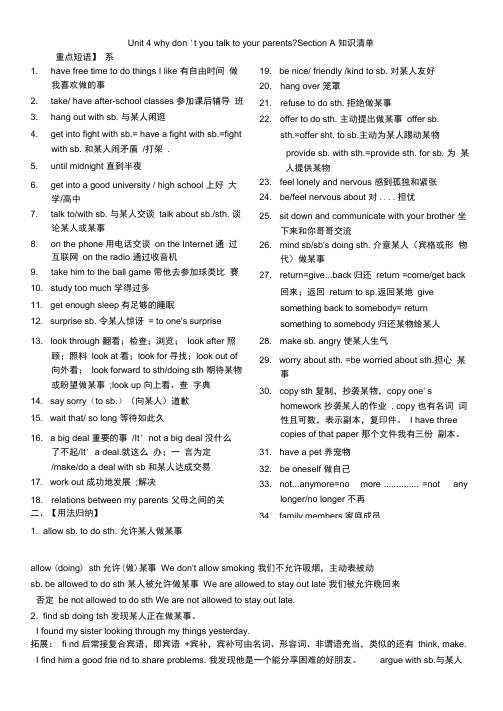
Unit 4 why don 't you talk to your parents?Section A 知识清单重点短语】 系 allow (doing ) sth 允许(做)某事 We don't allow smoking 我们不允许吸烟,主动表被动 sb. be allowed to do sth 某人被允许做某事 We are allowed to stay out late 我们被允许晚回来 否定 be not allowed to do sth We are not allowed to stay out late. 2. find sb doing tsh 发现某人正在做某事。
I found my sister looking through my things yesterday.拓展: fi nd 后常接复合宾语,即宾语 +宾补,宾补可由名词、形容词、非谓语充当,类似的还有 think, make. I find him a good frie nd to share problems. 我发现他是一个能分享困难的好朋友。
argue with sb.与某人1. have free time to do things I like 有自由时间 做我喜欢做的事2. take/ have after-school classes 参加课后辅导 班3. hang out with sb. 与某人闲逛4.get into fight with sb.= have a fight with sb.=fight with sb. 和某人闹矛盾 /打架 . 5. until midnight 直到半夜6. get into a good university / high school 上好 大学/高中7. talk to/with sb. 与某人交谈 talk about sb./sth. 谈论某人或某事8. on the phone 用电话交谈 on the Internet 通 过互联网 on the radio 通过收音机9.take him to the ball game 带他去参加球类比 赛 10. study too much 学得过多 11. get enough sleep 有足够的睡眠12. surprise sb. 令某人惊讶 = to one's surprise 13. look through 翻看;检查;浏览; look after 照顾;照料 look at 看;look for 寻找;look out of 向外看; look forward to sth/doing sth 期待某物或盼望做某事 ;look up 向上看、查 字典 14. say sorry (to sb.)(向某人)道歉 15. wait that/ so long 等待如此久16. a big deal 重要的事 /It ' not a big deal 没什么了不起/It ' a deal.就这么 办;一 言为定 /make/do a deal with sb 和某人达成交易 17. work out 成功地发展 ;解决18. relations between my parents 父母之间的关 二、【用法归纳】1. allow sb. to do sth. 允许某人做某事19. be nice/ friendly /kind to sb. 对某人友好 20. hang over 笼罩21. refuse to do sth. 拒绝做某事22. offer to do sth. 主动提出做某事 offer sb.sth.=offer sht. to sb.主动为某人踢动某物 provide sb. with sth.=provide sth. for sb. 为 某人提供某物23. feel lonely and nervous 感到孤独和紧张 24. be/feel nervous about 对 .... 担忧25. sit down and communicate with your brother 坐下来和你哥哥交流26. mind sb/sb's doing sth. 介意某人(宾格或形 物代)做某事27. return=give...back 归还 return =come/get back回来;返回 return to sp.返回某地 give something back to somebody= return something to somebody 归还某物给某人 28. make sb. angry 使某人生气29. worry about sth. =be worried about sth.担心 某事30. copy sth 复制,抄袭某物,copy one' shomework 抄袭某人的作业 . copy 也有名词 词性且可数,表示副本,复印件。
八年级下册英语第四单元知识点

八年级下册英语第四单元知识点Unit4 How do you get to school?词组1.到达学校get to school2.乘地铁take the subway3.乘火车take the train4.起床get up5.吃快餐have a quick breakfast6.离开学校leave for school7.大约在6点30分at around six thirty8.公共汽车站the bus station9.早班车the early bus10.带他去学校take him to school11.乘公共汽车的路程the bus ride12.在北美洲in North America13.乘校车on the school bus14.在世界的其他区域in other parts of the world15.在日本in Japan16.乘火车去学校take trains to school17.在中国in China18.在大城市in big city19.骑自行车去学校ride bikes to school20.像红珊瑚和开山岛一样有河和湖的地方In places where there are rivers and lakes,like Hongshanhu and Kaishandao.21.坐船去学校go to school by boat22.那取决于你在哪it depends on where you are23.那肯定比乘公共汽车有趣的多That must be a lot more fun than taking a bus.24.三种最流行的到达学校的方式the three most popular ways of getting to school25.最流行的交通方式the most popular means of transportation26.在红珊瑚和开山岛的学生students in Hongshanhu and Kaishandao27.花园中学Garden High School28.我能帮助你吗?Can I help you?29.好的Yes,please.30.我需要去看我的朋友I need to see my friend.31.生病be ill32.用英语in English33.说英语speak English34.我如何到达那里? How do I get there?35.不要担心. Don’t worry.36.让我看看你的地图. Let me look at your map.37.非常谢谢你thank you so much二、知识点walkride a bike1.动词短语(做take the subway 谓语动词,放take the car在主语之后)take the taxitake the bustake the planetake the boat/shipdrive a car2.介词短语on foot(放句尾)by bikeby subwayby carby taxiby busby plane/airby boat/ship/seaby car3.介词短语: subwayon/in trainshipplanein the boat , on the ship , in a taxi , on a bike , on a motorbike , on a bus.4.到达 get toarrive in+大地点at+小地点reach(及物动词,后可直接加地点)5.固定短型:It takes sb.+时间/金钱+to do sth.6.quick(副词)quicklyfar(反义词) nearkilometer(复数) kilometersshower(复数)showersshower(同义短语)take a showerhave a showerbicycle(同义词)bikeearly(反义词)latemile(复数)miles7. It’s about 10 kilometers from school to Lin Fei’s home.= Lin Fei’s home is about 10 kilom eters from school.8.= leave for+地点go to+地点take…to… 把…带到…去bring…to… 把…拿到…来9.A地离B地是远的A+be+far+(away)from+BA地离B地是多少A+be+一段距离+(away)from+BA地离B地的距离It+一段距离+from A to B.Thomas wants to know…10.动词后是宾语,宾语由一个句子构成,叫宾语从句,语序为陈述句语序,而不是一般疑问句语序。
八年级下册英语第四单元知识点
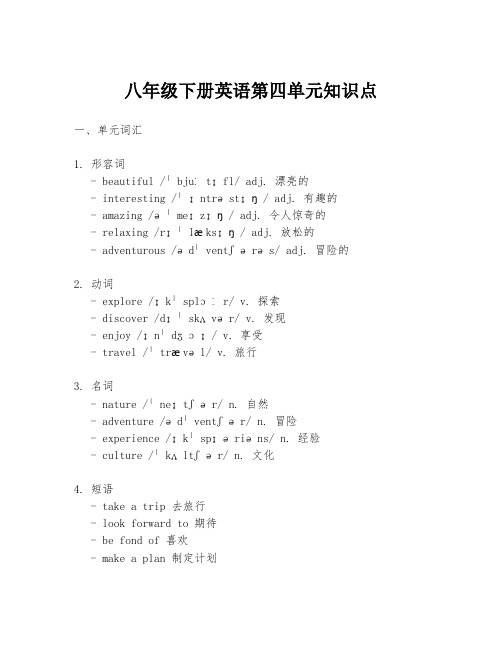
八年级下册英语第四单元知识点一、单元词汇1. 形容词- beautiful /ˈbjuːtɪfl/ adj. 漂亮的- interesting /ˈɪntrəstɪŋ/ adj. 有趣的- amazing /əˈmeɪzɪŋ/ adj. 令人惊奇的- relaxing /rɪˈlæksɪŋ/ adj. 放松的- adventurous /ədˈventʃərəs/ adj. 冒险的2. 动词- explore /ɪkˈsplɔːr/ v. 探索- discover /dɪˈskʌvər/ v. 发现- enjoy /ɪnˈdʒɔɪ/ v. 享受- travel /ˈtrævəl/ v. 旅行3. 名词- nature /ˈneɪtʃər/ n. 自然- adventure /ədˈventʃər/ n. 冒险- experience /ɪkˈspɪəriəns/ n. 经验- culture /ˈkʌltʃər/ n. 文化4. 短语- take a trip 去旅行- look forward to 期待- be fond of 喜欢- make a plan 制定计划二、语法点1. 一般将来时- 用法:表示将来某一时间要发生的动作或状态。
- 结构:主语 + will + 动词原形 + 其他。
2. 现在进行时表示将来- 用法:表示按计划或安排将要发生的动作。
- 结构:主语 + am/is/are going to + 动词原形 + 其他。
3. 形容词的比较级和最高级- 用法:比较两者或三者以上的人或事物。
- 结构:比较级 - 更…,最高级 - 最…。
三、重点句型1. I can’t wait to…- 用法:表示迫不及待要做某事。
- 例句:I can’t wait to see the Eiffel Tower.2. It’s a good idea to…- 用法:表示做某事是个好主意。
初中语文八下第四单元知识点总结

初中语文八下第四单元知识点总结初中语文八下第四单元知识点总结第一节人称代词人称代词是代替人名或人的称呼的词语,代替的人称应与句子的主语或宾语的人称一致。
例如:我书包丢了,真是困扰。
人称代词主要分为三种:一、第一人称代词,表示说话人自己。
常见的有:我、我们等。
二、第二人称代词,表示被说话对象。
常见的有:你、你们等。
三、第三人称代词,表示与说话人和被说话对象无关的人或事物。
常见的有:他、她、它(指代物)、他们、她们(指人)等。
第二节动词的时态动词的时态表示动作发生的时间。
常见的时态有:一、一般现在时:表示经常性或习惯性的动作。
例如:我每天都去学校。
二、一般过去时:表示过去某个时间里的动作。
例如:昨天我去了动物园。
三、一般将来时:表示将来某个时间里的动作。
例如:我明天要去上海。
四、现在进行时:表示正在进行或发生的动作。
例如:他正在做作业。
五、过去进行时:表示过去某个时间里正在进行或发生的动作。
例如:昨天这个时候,他们正在看电影。
第三节状语从句状语从句是修饰动词、形容词、副词等的从句,用来表示时间、地点、原因、目的、条件等。
常见的状语从句有:一、时间状语从句:表示动作发生的时间。
例如:当我看到她的时候,她正在哭。
二、地点状语从句:表示动作发生的地点。
例如:他们在哪里见面。
三、原因状语从句:表示动作的原因。
例如:因为下雨,他们没有去公园。
四、目的状语从句:表示动作的目的。
例如:我去商店买纸,为了写作业。
五、条件状语从句:表示动作发生的条件。
例如:如果你努力学习,就会取得好成绩。
第四节古诗文鉴赏技巧读古诗文需要掌握一定的鉴赏技巧,包括把握诗句的意境、理解诗文的意蕴、理解典故等。
常用的鉴赏技巧有:一、抓住诗句的含义:通过理解诗句的意思和表达方式,抓住诗歌的主旨和主题。
例如:《静夜思》中的“床前明月光,疑是地上霜”,描述了诗人在夜晚思念远方亲人的情景。
二、理解诗文的意境:要通过细致入微的描写,感受诗歌所表达的美好景象或深刻情感。
人教版英语八年级下第四单元知识点梳理
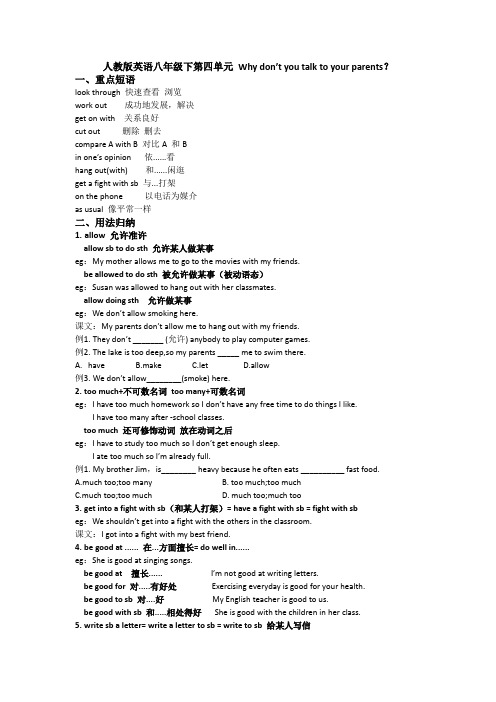
人教版英语八年级下第四单元Why don’t you talk to your parents?一、重点短语look through 快速查看浏览work out 成功地发展,解决get on with 关系良好cut out 删除删去compare A with B 对比A 和Bin one’s opinion 依......看hang out(with) 和......闲逛get a fight with sb 与...打架on the phone 以电话为媒介as usual 像平常一样二、用法归纳1.allow 允许准许allow sb to do sth 允许某人做某事eg:My mother allows me to go to the movies with my friends.be allowed to do sth 被允许做某事(被动语态)eg:Susan was allowed to hang out with her classmates.allow doing sth 允许做某事eg:We don’t allow smoking here.课文:My parents don’t allow me to hang out with my friends.例1.They don’t _______ (允许) anybody to play computer games.例2.The lake is too deep,so my parents _____ me to swim there.A.haveB.makeC.letD.allow例3.We don’t allow________(smoke) here.2.too much+不可数名词too many+可数名词eg:I have too much homework so I don’t have any free time to do things I like.I have too many after -school classes.too much 还可修饰动词放在动词之后eg:I have to study too much so I don’t get enough sleep.I ate too much so I’m already full.例1.My brother Jim,is________ heavy because he often eats __________ fast food. A.much too;too many B. too much;too muchC.much too;too muchD. much too;much too3.get into a fight with sb(和某人打架)= have a fight with sb = fight with sbeg:We shouldn’t get into a fight with the others in the classroom.课文:I got into a fight with my best friend.4.be good at ...... 在...方面擅长= do well in......eg:She is good at singing songs.be good at 擅长...... I’m not good at writing letters.be good for 对.....有好处Exercising everyday is good for your health.be good to sb 对....好My English teacher is good to us.be good with sb 和.....相处得好She is good with the children in her class.5.write sb a letter= write a letter to sb = write to sb 给某人写信eg:You could write him a letter.receive a letter from sb =hear from sb =receive sb’s letter 收到某人的来信6.课文:I found my sister looking through my things yesterday.find sb doing sth 发现某人正在做某事find sb do sth 发现某人做过某事eg:I found my little bother playing the computer games.类似用法的词:hear watch feel seelook through 快速浏览,查看look 的短语:look for 寻找look after = take care of = care for 照顾look forward to (doing)期望做某事look like 看起来像look up 查阅例1.I found Tom ______ my notebook.A.looking throughB. looking upC.looking forward toD.looking after7.课文:I’m still angry with her.angry adj 生气的;angrily adv生气地be angry with sb 生某人的气be angry at sth 生某事/物的气eg:Jim was very angry at his bike because it didn’t work.I went to the movies without telling my mother so she is really angry with me.例1.My mother is angry ______ me.What __________ I do?A.at;doB.with;wouldC.with;shouldD.about;would 例2.Li Lei’s mother ________ him because he went out to play in the rain.A.was angry withB.was pleasedC.was proud of例3.I was very angry ________ myself ________making such a stupid mistake.A.at;atB.with;forC.at;withD.with;in8.get on(well)with sb =get along (well)with sb 和某人相处(得好)eg:My problem is that I can’t get on with my family.get on badly with sb 和某人相处的差9.课文:I don’t want to surprise him. 我不想去让他惊讶。
八年级下册英语第四单元知识点

八年级下册英语第四单元知识点知识是人们前进的最大动力,因为有知识,我们知道我们从哪里来,也知道我们将要到哪里去。
接下来小编给大家分享关于八年级下册英语第四单元知识,希望对大家有所帮助!八年级下册英语第四单元知识1重要词汇和句型1.get ( 1 ) 买 get sth. for sb.== get sb. sth. 为某人买某物Can you get some fruit for me when you go shopping?==Can you get me some fruit when you go shopping?( 2 ) 得到, 到达 Where did you get the book?When did you get the letter ?He got home late last night.(3) 使, 让 get + 宾语 + 宾补使某人\ 某物怎么样Please get you coat clean. Get your mouth closed.get sb. to do sth. 使某人\ 某物做某事I got him to call Jim yesterday.(4) ( 逐渐) 变得…The weather gets warmer and days get longer.Why did the teacher get angry?2. how about\ what about 后跟名词\ 代词\ 动词ing形式。
( 1) 向对方提出建议或请求How about going out for a walk?How about something to eat(2) 向对方征求意见或看法How about the TV play? How about buying thehouse now ?( 3 ) 询问天气或身体情况How about the weather in Hainan Island ?How about your parents? Are they living with you?( 4 ) 谈话中承接上下文I’m forty years old. How about you ?I’m from Beijing . How about you?3. receive 收到 The girl was happy to receive many gifts on her birthd ay.receive aletter from == get a letter from == heard from 收到某人的信I received a letter from my parents last Sunday.== I got a letter from my parents last Sunday.== I heard from my parents last Sunday.accept 接受 He couldn’t accept our suggestions but our gifts.She was very glad to receive the invitation.He didn’t receive a good education at university.I received an invitation to the party, but I refused to a ccept it.4. a 6--year– old child 一个六岁的孩子6--year –old 是由“数词 +名词 + 形容词” 构成的复合形容词, 作前置定语,修饰后面的名词child .数词+名词+形容词构成的复合形容词,中间的名词要用单数形式:a five-year-old girl 一个五岁的女孩a six-foot-deep hole 一个六英尺深的洞a two-meter-long ruler 一把两米长的尺子 a 100-meter race 一场百米赛跑 a ten-story-high building 一栋十层高的楼房 a two-inch-thick dictionary一本两英寸厚的词典5. too…to… 太……而不能……too …to… 可以与 enough to 和so… that … 转换.与enough to转换时, enough 前的形容词, 副词必须是too 后面形容词,副词的反义词, 并使用其否定句式.She is too young to do the work .she isn’t old enough to do the work .与so… that … 转换时, that 后面的从句要用否定形式.Tom is too tired to walk any farther .Tom is so tired that he can’t walk any farther(2 ) 名词, 成本, 费用, 价钱. at all costs不惜任何代价;at the cost of 以…… 为代价.Living costs are higher in cities than that in the country.We must stop it at all costs .After the earthquake, the soldiers tried to reach the ar ea at thecost of their lives.7. pay, spend , cost , take 的区别pay 花费( 多少钱) , 主语是人. Sb. pay some money for sth.I paid 5000 yuan for the computer last week.Spend 花费( 多少钱或时间),主语是人. Sb. spend somemoney on sth.Sb. spend some time (in ) doing sth.I spent 5000 yuan on the computer last week.She spent 2 hours (in ) doing her homework .cost 花费 ( 多少钱 ) , 主语是物. Sth. cost sb. some money.This jacket cost him 200 dollars.take 花费 (时间 ),It takes sb. some time to do sth.花费某人多少时间做某事How long does it take sb. to do sth?花费某人多少时间做某事?It took Liu Hong 2 hours to do her homework.It takes me 10 minutes to walk to school from home.It will take them 6 months to build the building.How long does it take him to plant the trees ?8. sleep, sleeping, sleepy , asleep, fall asleep , be asle epsleep 动词, 睡觉, 强调动作. I am very tired.I want to sleep .He slept for 12 hours yesterday.sleeping, Sleep 的现在分词, 表示“ 正在睡觉”Don’t make so much noise. The baby is sleeping .They woke up the sleeping girl andasked her where her parents were .sleepy 想睡觉的, 困倦的. I am a little sleepy . I’d like to go to bed.asleep 睡着了的.Theteacher found Tom asleep in class andkept him behind after school .Would you mind turning down the TV? The baby is as leep .fall asleep 强调从没有睡着到睡着的过程, 不能接一段时间I couldn’t fall asleep until it was very late last night.He listened to music and fell asleep.be asleep 表示睡着后的状态, “ 睡着了”, 可以接一段时间 .He was asleep for three hours.9. choose 动词, “ 选择,挑选” , 过去式chose, 过去分词chosenchoose to do sth. 选择做某事can’t Choose but 只得……pick and choose 挑挑拣拣There are many books to choose from .We choose mike as our leader( 领导 ).Will you help me choose a dictionary?Everyone can’t choose but obey( 服从 ) .It’s her habit (习惯 ) to pick and choose while shopping.10. present (1) 礼物, 礼品 == gift Why not givehim a card as a present ?what can I get him for a birthday present ?(2 ) 目前, 现在I’m sorry he is out at present .Youhaveto forget the past and start living in the present .11. open (1 ) 动词, 打开 , 开业, 开张, 展现It’s not right to open other people’s letters.Would you mind opening the window?The door opens to the south.This factory opened in 1998.(2 ) 形容词, be open 开着的, 开放的In his dream the flowers are all open .Most shops are closed but several are still open .On weekends the swimmingpool is open to the public .close 动词, 关闭, 关上 , 合上Please close the door to keep the cold out.closed 形容词, be closed 关着的, 关闭的when we got to the shop it was closed .12 . give away 赠送 , 分发 give away sth to sbAunt Wang gave away the candies (糖果 ) to the kids .John gave away his notebook to me .其它短语 give up 放弃 give back 归还 give off 放出, 发出(气味)give sth to sb == give sb. sth . 把某物给某人13. rather than 而不是…… 后面跟名词, 代词, 从句The color seems green rather than blue .If you ran rather than walked , you would have arrived earlier .We depend on you rather than on him .You should help them rather than they should help you .prefer to do sth rather than do sth . 宁愿…… ,也不……She preferred to stay at home rather than go with us .He preferred to listen to music rather than play games .Would rather do sth than do sth . 宁愿…… ,也不……He would rather play than work .I would rather take the slowest train than go there by air .14. instead (1) 位于句首, 表示“ 反而, 相反”Ididn’t go to the cinema last night . instead, I watched a football match on TV.The boy didn’t sing to the music . Instead , he sang his own way .( 2 ) 位于句尾, 表示“ 作为代替, 而是”Mr smith was ill , so mr green was taking his class ins tead .I don’t like this one , please give me that instead .instead of 后跟名词, 代词, 动名词, 介词短语.表示“ 代替, 而不是”I have come instead of my brother . He is ill .We walked down the stairs instead of taking the elevator ( 电梯 ) .He studies in the evening instead of during the day .15. enter (1) 参加 == take part in \ joinMore than one thousand sportsmen entered \ took part in the games .My brother hopes to enter \ join the army next year .( 2 ) 进入 ==come into \ go intoShe entered\ came into the room with these words .Did you see someone enter \ go into the house ?16. encourage 动词, 鼓励, 激励 encourage sb. to do sth.鼓励某人做某事Parents should encourage children to do things by the mselves .Our English teacher encourages us to keep a dairy in English .17. progress 名词, “ 进步, 进展” make progress “取得进步, 取得进展”My parents are pleased with my progress in lessons .Tom is now making much \ great progress at school .They made no progress in the heavy snow .18. suggest 动词, 建议, 提议. 后跟名词, 代词, 动名词和从句she suggested a way out of the difficulty .he suggested going home .who suggested you staying here ?I suggested we ( should ) hold a meeting .19. take an interest in ( doing ) sth. 对 ( 做 )某事感兴趣否定表达是 take no interest in ( doing ) sth. 对 ( 做 )某事不感兴趣Do you take an interest in English ?Most children take an interest in playing computer ga mes .He takes no interest in playing basketball .be \ become interested in ( doing ) sth对 ( 做 )某事感兴趣I’m deeply interested in swimming .She becameinterested in singing when she was only 7 years old .20. Three good ways of improving English are mention ed .提到了三种提高英语的好方法.of improving English是介词短语作定语修饰ways . 它相当与动词不定式.Three good ways of improving English are mentioned .===Three good ways to improve English are mentioned .Can you find a way to work out the problem ?==Can you find a way of working out the problem ?Fast is another way of saying quick .== Fast is another way to say quick .Mention (1) 动词, “ 提到, 提及, 说起”as mentioned above 如上所述He often mentioned his past to me .Nobody mentioned anything to me about it .Did she mention where she was going ?You mentioned in your letter that you might be movin g abroad .As mentioned above , there are many good ways to learn English well .( 2 ) 名词, “ 提及, 说起”The newspaper made no mention of him .21. make friends with sb. 和某人交朋友Would you like to make friends with us ?I find it difficult to make friends with Ben .八年级下册英语第四单元知识2形容词一、形容词(一)形容词的含义:表示人或事物的特征、性质、状态的词叫形容词。
八年级下册英语第四单元2d知识点
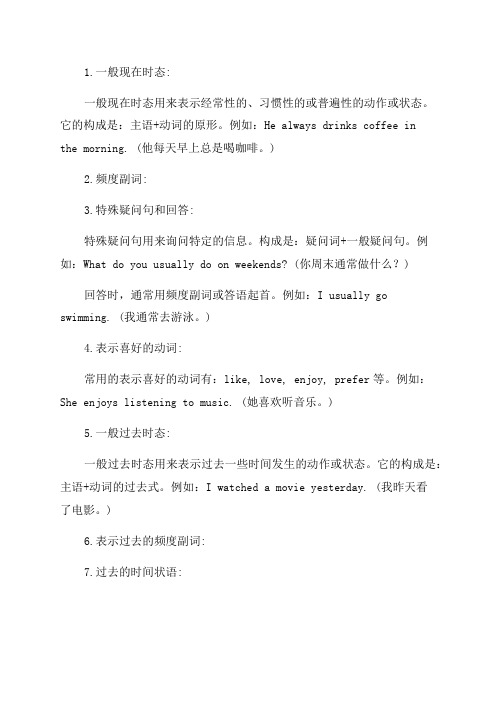
1.一般现在时态:一般现在时态用来表示经常性的、习惯性的或普遍性的动作或状态。
它的构成是:主语+动词的原形。
例如:He always drinks coffee inthe morning. (他每天早上总是喝咖啡。
)2.频度副词:3.特殊疑问句和回答:特殊疑问句用来询问特定的信息。
构成是:疑问词+一般疑问句。
例如:What do you usually do on weekends? (你周末通常做什么?)回答时,通常用频度副词或答语起首。
例如:I usually go swimming. (我通常去游泳。
)4.表示喜好的动词:常用的表示喜好的动词有:like, love, enjoy, prefer等。
例如:She enjoys listening to music. (她喜欢听音乐。
)5.一般过去时态:一般过去时态用来表示过去一些时间发生的动作或状态。
它的构成是:主语+动词的过去式。
例如:I watched a movie yesterday. (我昨天看了电影。
)6.表示过去的频度副词:7.过去的时间状语:过去的时间状语用来表示过去一些时间发生的动作或状态。
例如:yesterday, last week, two days ago等。
例如:He went to the beach last weekend. (他上周末去了海滩。
)8.句型转换:句型转换可以通过改变句子的结构或使用不同的词语来表达相同的意思。
例如:He always drinks coffee. (这是一个陈述句)Does he always drink coffee? (这是一个一般疑问句)注意在一般疑问句中,需要在句子开头加上助动词does.9.定语从句:定语从句用来给一个名词或代词加以修饰或限定。
它的引导词有:that, which, who, whom等。
例如:The book that I borrowed from the library is very interesting. (我从图书馆借的那本书很有趣。
人教版八年级下册英语Unit 4 知识点语法归纳总结

Unit 4 Why don’t you talk to your parents?1.短语归纳2.典句必背3.用法集萃(1)My parents don't allow me to hang out with my friends. 我的父母不允许我和我的朋友们出去闲逛。
❖allow作动词,意为“允许;准许”。
allow sb. to do sth. 意为“允许某人做某事”,也可以是allow sb. sth.例:His parents won't allow him to stay out late. 他的父母不允许他在外面待到很晚。
Each passenger is allowed 20 kilograms of baggage. 每位旅客准许携带20千克行李。
❖allow sb. to do sth.的被动结构是:“sb. be allowed to do sth.” 某人被允许做某事例:We are allowed to choose our own clothes. 我们被允许选择自己的衣服。
The children are not allowed to play on this lawn. 孩子们不准在这块草地上玩耍。
(2)What’s wrong?怎么了?❖wrong作形容词,意为“有毛病的;错误的”例:There’s something wrong with my bike. 我的自行车出毛病了。
I’m sorry to tell you that your answers are wrong. 我很遗憾地告诉你,你的答案错了。
❖拓展:wrong的延伸(3)I’m really tired because I studied until midnight last night.我真的很累,因为我昨天晚上一直学习到半夜。
❖because是连词,意为“因为”,引导原因状语从句。
最全面人教版八年级下册英语第四单元知识点归纳总结
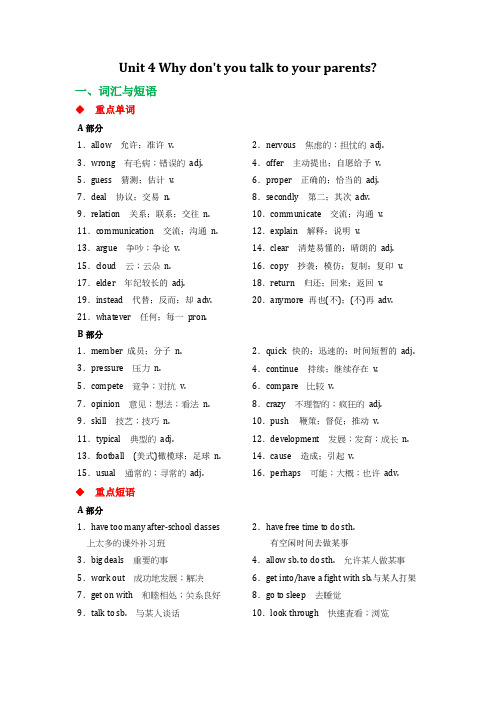
Unit 4 Why don't you talk to your parents?一、词汇与短语◆重点单词A部分1.allow 允许;准许v.2.nervous 焦虑的;担忧的adj. 3.wrong 有毛病;错误的adj.4.offer 主动提出;自愿给予v. 5.guess 猜测;估计v.6.proper 正确的;恰当的adj. 7.deal 协议;交易n.8.secondly 第二;其次adv. 9.relation 关系;联系;交往n.10.communicate 交流;沟通v. 11.communication 交流;沟通n.12.explain 解释;说明v.13.argue 争吵;争论v.14.clear 清楚易懂的;晴朗的adj. 15.cloud 云;云朵n.16.copy 抄袭;模仿;复制;复印v. 17.elder 年纪较长的adj.18.return 归还;回来;返回v. 19.instead 代替;反而;却adv.20.anymore 再也(不);(不)再adv. 21.whatever 任何;每一pron.B部分1.member 成员;分子n.2.quick 快的;迅速的;时间短暂的adj. 3.pressure 压力n.4.continue 持续;继续存在v. 5.compete 竞争;对抗v.6.compare 比较v.7.opinion 意见;想法;看法n.8.crazy 不理智的;疯狂的adj. 9.skill 技艺;技巧n.10.push 鞭策;督促;推动v. 11.typical 典型的adj.12.development 发展;发育;成长n. 13.football (美式)橄榄球;足球n.14.cause 造成;引起v.15.usual 通常的;寻常的adj.16.perhaps 可能;大概;也许adv.◆重点短语A部分1.have too many after-school classes 上太多的课外补习班2.have free time to do sth.有空闲时间去做某事3.big deals 重要的事4.allow sb. to do sth. 允许某人做某事5.work out 成功地发展;解决6.get into/have a fight with sb.与某人打架7.get on with 和睦相处;关系良好8.go to sleep 去睡觉9.talk to sb. 与某人谈话10.look through 快速査看;浏览11.get enough sleep 得到充足的睡眠12.call sb. up 给某人打电话13.on the phone 在电话中14.so that 以便;为了15.give sth. back to sb. 把某物归还给某人16.forget about sth. 忘记关于某事17.hang over 笼罩在……18.be nice to sb. 对某人友好19.until late at night 直到深夜20.refuse to do sth. 拒绝做某事21.let sb. do sth. 让某人做某事22.talk about sth. with sb.与某人谈论某事23.offer to do sth. 主动提出做某事24.be afraid of doing sth. 害怕做某事25.communicate with sb. 与某人交流B部分1.in one's opinion 依……看2.spend time alone 独自消磨时光3.a lot of pressure 许多压力4.not……until……直到……才……5.free time activities 业余活动6.have a quick dinner 很快吃完晚饭7.the common problem 普遍问题8.compare…with…把…和…作比较,对比9.cut out 删除;删去10.know about 了解11.be important for sth. 对……重要12.keep on doing sth. 一直做某事13.send sb. to……派某人去……14.worry about 担心15.give one's opinion about sth.就某事给出某人的观点16.differences and similarities 不同点和相似点17.too much pressure 太多的压力18.compete with sb. 与某人竞争19.think for oneself 为某人自己着想20.push sb. so hard 逼迫某人太紧21.cause a lot of stress for sb. 给某人造成很多压力◆重点句子A部分1.Why don't you go to sleep earlier this evening? 为什么你今晚不早点儿去睡觉呢?2.What's wrong with you? 你哪儿不舒服?3.Although she's wrong, it's not a big deal. 尽管她做得不对,但也没什么大不了的。
人教版八年级英语下册第四单元知识点汇总总结

人教版八年级英语下册第四单元知识点汇总总结01、重点短语1. look through 快速查看;浏览2. work out 成功地发展;解决3. get on with 和睦相处; 关系良好4. have free time to do sth.有空闲时间去做某事5. get into/have a fight with sb.与某人打架6. have too many after-school classes 上太多的课外补习班7. call sb. up 给某人打电话8. on the phone在电话中9. so that 以便10. give sth. back to sb.把某物归还给某人11. forget about sth. 忘记某事12. hang over 笼罩在……上方13. be nice to sb. 对某人友好14. refuse to do sth. 拒绝做某事15. offer to do sth. 主动做某事16. communicate with sb. 与某人交流17. agree/disagree with sb./sth.同意/不同意某人或某事物18. explain sth. to sb. 向某人解释某事19. common problems 普遍问题20. spend time alone 独自消磨时光21. free time activities 业余活动22. cut out 删除;删去23. all kinds of 各种各样的24. in one’s opinion 依……看25. give one’s opinion about sth.就某事给出某人的观点26. be important for/to sb.对某人来说重要27. know about 了解28. send sb. to…送某人去……29. too much pressure 太多的压力30. think for oneself 为某人自己着想31. keep on doing sth. 一直做某事32. worry about 担心33. differences and similarities不同点和相似点34. compete with sb. 与某人竞争35. cause a lot of stress for sb.给某人造成很多压力02、重点句子Grammar Focus 句子1. You look tired. What’s the matter?你看起来累,怎么啦?2. I studied until midnight last night so I didn’t get enough sleep.我昨晚学习直到半夜,所以我没有足够的睡眠。
- 1、下载文档前请自行甄别文档内容的完整性,平台不提供额外的编辑、内容补充、找答案等附加服务。
- 2、"仅部分预览"的文档,不可在线预览部分如存在完整性等问题,可反馈申请退款(可完整预览的文档不适用该条件!)。
- 3、如文档侵犯您的权益,请联系客服反馈,我们会尽快为您处理(人工客服工作时间:9:00-18:30)。
1.have free time[] 有空闲时间
2.allow somebody to do something[] 允许某人做某事
3.hang out with somebody[]与某人闲逛
4.after-school classes[]课外活动课
5.get into a fight with somebody[]与某人吵架/打架
6.until midnight[]直到半夜
7.talk to somebody[]与某人交谈
8.too many[]太多
9.study too much[] 学得过多
10.get enough sleep[]有足够的睡眠
11.write somebody a letter[]给某人写信
12.call somebody up[]打电话给某人
13.surprise somebody[] 令某人惊讶
14.look through[]浏览
15.be angry with somebody[]生某人的气
16.a big deal[] 重要的事
17.work out[]成功地发展;解决
18.get on with[]和睦相处;关系良好:
19.fight a lot[] 经常吵架/打架
20.hang over[]笼罩
21.refuse to do something[] 拒绝做某事
22.offer to do something[]主动提出做某事
23.so that[]以便
24.mind somebody doing something[]介意某人做某事
25.all the time[]一直
26.in future[]今后
27.make somebody angry[] 使某人生气
28.worry about something[] 担心某事
29.copy one’ s homework[] 抄袭某人的作业
30.be oneself[]做自己
31.family members[]家庭成员
32.spend time alone[]独自消磨时光
33.give somebody pressure[]给某人施压
34.have a fight with somebody[]与某人吵架
pete with somebody[]与某人竞争
36.free time activities[]业余活动
37.get better grades[]取得更好的成绩
38.give one’ s opinion[] 提出某人的观点
39.learn exam skills[]学习应试技巧
40.practice sports[] 体育训练
41.cause stress[]造成压力
42.cut out[] 删除
43.allow somebody to do something[]允许某人做某事
44.w hy don’t you do something[]为什么不做某事
45.want to do something[]想要做某事
46.find somebody doing something[]发现某人正在做某事
47.find somebody do something[]发现某人做过某事
48.see somebody doing something[]看见某人正在做某事
49.see somebody do something[]看见某人做过某事
50.tell somebody to do something[]让某人做某事
51.make somebody do something[]让某人做某事
52.let somebody do something[]让某人做某事
53.keep somebody doing something[]让某人做某事
54.refuse somebody to do something[]拒绝做某事
55.offer to do something[]主动做某事
56.mind somebody doing something[]介意某人做某事
57.not…until…[]直到...才...
58.it’s time to do something[]到了做某事的时间
59.keep on doing something[]持续做某事
60.what do you think of[]你怎么看。
